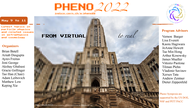Speaker
Description
The Migdal effect, which describes electronic transitions after nuclear scattering, has been proposed as a mechanism for direct detection of light dark matter. The Migdal effect can be understood as a first order departure from the Born-Oppenheimer approximation of factorization of electrons and nuclei, and thus molecules are an especially interesting system to study this effect. I will present calculations of the Migdal effect in the simplest molecular system, the hydrogen molecular ion ($H_2^+$), with the goal of understanding how this effect generalizes to more complicated molecules. I will describe two qualitatively different contributions to the Migdal effect, one of which is a straightforward generalization of the atomic Migdal effect but the other of which is unique to molecules. Our results suggest the interesting possibility of observing large daily modulation from dark matter-nuclear scattering in molecular systems.




